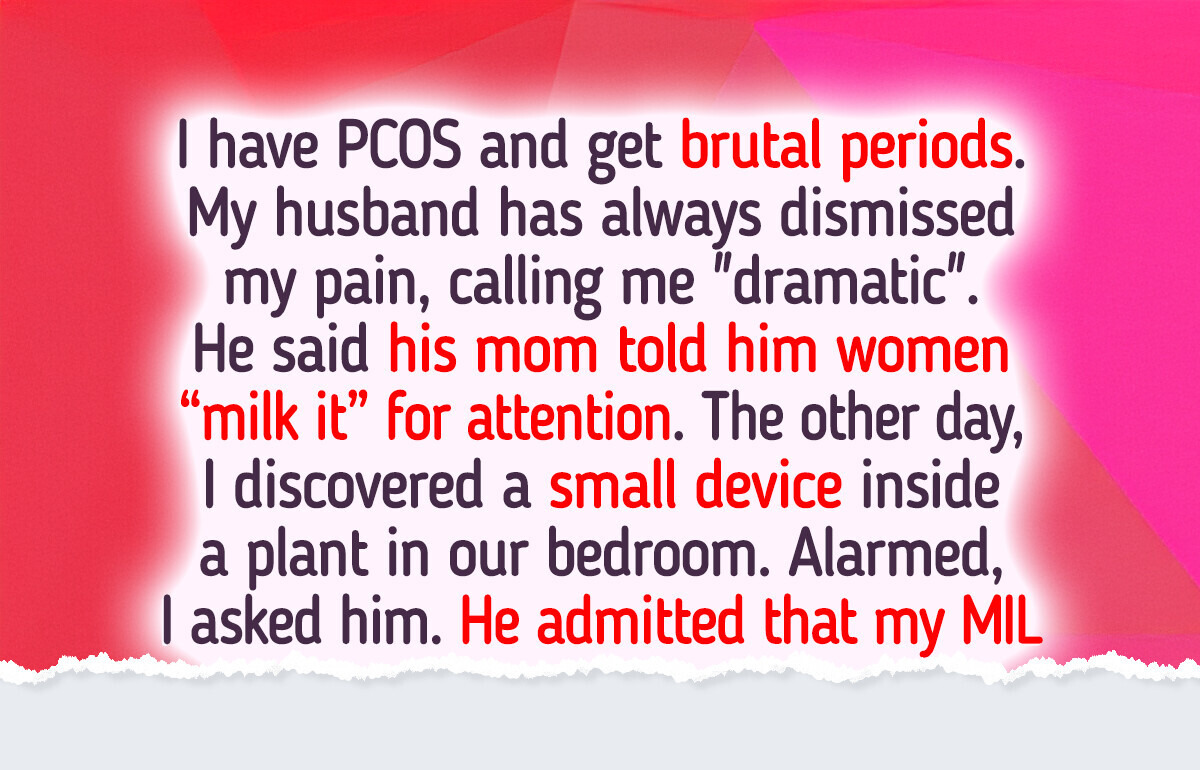You betrayed his trust? He betrayed yours! Your next step should be a divorce lawyer.
My Husband Thought I Was Faking My Period Pain—So He Secretly Set a Trap With His Mother

Family conflict can take many painful forms, especially when chronic illness is misunderstood or dismissed by those closest to us. Stories of betrayal, broken trust, and emotional neglect inside marriages often spark strong emotions and deep reflection. One reader recently sent us a letter about a shocking discovery that exposed a serious breach of trust in her home.
Here’s Patricia’s letter:

Hi Bright side,
I’m 35, and I’ve lived with PCOS for over a decade now. I get painful periods. Some months I can barely move, curled up in bed as waves of pain crash through me like violent tides.
My husband, the person I should be able to lean on most during those moments, has never taken it seriously. For years, he’s dismissed my pain, claiming I’m just “being dramatic.” He’s said I’m exaggerating when I cancel plans or when I spend the day tucked under blankets.
The other day, I discovered a small device inside a potted plant in our bedroom. Alarmed,
I asked him. He admitted that my MIL had told him to install a small, motion-activated camera in our bedroom, because they wanted to prove that I was moving around just fine, that I wasn’t really that sick. His exact words were, “I just needed to know if you were telling the truth.”

My stomach dropped. I stared at him, trying to process what I’d just heard. He installed a camera. In our bedroom. Not out of concern. Not for safety.
But to spy on me. To “catch” me in some imagined lie. He said he deleted the footage, but I don’t believe him. And even if he did—how can I trust that the footage was all he took? Or that he won’t do something like this again?
When I confronted him, shaking with fury and betrayal, he had the audacity to tell me I was violating his trust. That I was overreacting. That his mother used to say women would do this trick when they didn’t feel like doing something.
I couldn’t breathe. The man who vowed to love and protect me thought I was pretending? That I’d go to such lengths, suffer such pain, for attention?
That night, I packed a small bag, grabbed my essentials, and left. I didn’t even argue. I was too numb. I drove straight to my mother’s house and have been staying here since. He’s been calling, texting, leaving voicemails about how sorry he is.
But every message feels hollow. He’s never really supported me during my worst moments—only tolerated me. And now I see that he never truly believed me to begin with. I don’t know what the future holds. I don’t know if I can go back to someone who saw my suffering as manipulation.
Sincerely
Patricia

We’re so sorry to hear about your situation, Patricia. To help you navigate this deeply painful and complicated chapter with more clarity and strength, we’ve put together 4 distinct pieces of advice—each offering a different perspective on how to move forward.
Trust Isn’t Just Broken—It’s Redefined.
When someone violates your privacy in such an invasive way, it’s not just betrayal—it’s a redefinition of your entire relationship. A partner who secretly spies on you doesn’t just lack trust; they actively view you as untrustworthy without cause. That’s not something a single apology or a string of voicemails can fix.
Healing from this requires asking yourself not just whether you can forgive him, but whether he ever truly saw you as an equal. Until that power dynamic is rebalanced, and your autonomy is respected, trust cannot be rebuilt.
Document Everything—This Is Now About More Than Emotion.

You are not just grieving the emotional betrayal; you’ve also encountered behavior that borders on psychological abuse. Begin documenting every conversation, every message, and the discovery of the device—write it down with dates and context. This might sound cold, but it’s protection, not paranoia.
Whether or not you choose to return, you need to establish boundaries in writing—especially since your MIL was involved. Should things escalate, or legal matters arise, your future self will be grateful you kept a record.
You Don’t Owe Redemption to the Person Who Made You Feel Broken.
His remorse, even if genuine, doesn’t entitle him to another chance. You’ve spent years justifying your pain to someone who treated it as performance. Leaving wasn’t impulsive—it was a final act of self-preservation, long overdue.
If you do choose to engage with him again, do it for closure—not reconciliation. Sometimes strength isn’t in returning to try again, but in refusing to explain your pain to someone who was never listening.
Your Body Has Been Screaming—Now Your Soul Is Speaking.

Living with PCOS is exhausting. Having to defend that pain to your partner turned your home into a courtroom instead of a sanctuary. This betrayal could be the turning point where you decide to live somewhere you don’t have to convince anyone of your truth.
Whether that’s staying with your mother, finding your own space, or starting fresh somewhere entirely new—you now have the clarity of knowing what you will never tolerate again. Let your next chapter be built around peace, not permission.
Subjects such as caregiving, money matters, and setting boundaries often stir up intense emotions. One of our readers devoted years to supporting her daughter in every possible way. However, when she eventually opened up about her retirement plans, her daughter’s unexpected response shook the foundation of their relationship. Discover her powerful story below.
Comments
This is absolutely unforgivable I could never trust him or his nosy mother again
I'm sorry you are going through this you really need to rethink this marriage.
Your husband obviously doesn't trust you; consequently, he's not worthy of your trust. With no trust, there's no honesty. You did the right thing in leaving.
You betrayed his trust, because you accidentally found the camera that he hid in your bedroom? That man is so far gone. To be honest after that I wouldn't even believe his whiny phone message apologies. That sounds more like a gas lighting tactic than anything else. Emotional abuse on top of the ick factor of videotaping his wife and her bedroom. Unless you never got dressed or had sex in that room after that camera was installed he's got pornographic imagery without your consent. That's a crime, not just a violation of your trust.
Related Reads
My DIL Pushed Me Out of Their Family Circle—I Responded With the Ultimate Payback

10 Stories That Prove Choosing Kindness Makes Us Stronger, Not Weaker

I Demand That My Wife Get a Job Since Staying Home With Teens Isn’t Full-Time Work

18 Seniors Whose Sharp Wit Proves Humor Only Gets Better With Age

12 Real-Life Betrayals That Sound Like Movie Plots

I Refused to Follow My Boss’s Dress Code—HR Had to Step In

I Refused to Give Up My Baby, So My Mom Exposed a Terrible Secret

My Parents Wanted a ‘Family Vacation’ on My Budget—I Made One Move They Didn’t Expect

I Tried to Be the Perfect Stepmom — but My Husband Just Made Me Feel Worthless

My Cousin Uninvited Me to Save Money—My Petty Revenge Was Absolutely Worth It

I Kicked My Parents Out of My Graduation—They Didn’t Contribute to My Education

My Dad Demanded to Give My Stepsister the Spotlight on My Wedding—But I Reclaimed It
